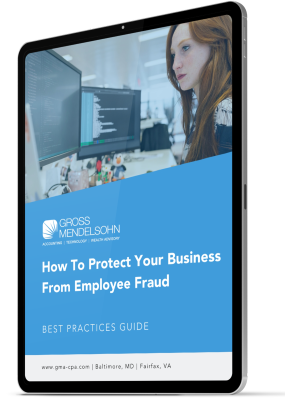According to the Association of Certified Fraud Examiners’ Report to the Nation of Occupational Fraud and Abuse, typical businesses lose 5% of their annual revenue to employee fraud. Your nonprofit organization doesn’t need to be one of them.Most employees who commit fraud exhibit tell-tale signs before the fraud is detected. It may surprise you that, most of the time, the fraud is committed by someone you trust. If you think about it, if you didn’t trust them, you would not have put them in a sensitive position.
Being aware of the signs may help you detect fraud before it becomes disastrous to your organization. These warning signs are not absolute signs that fraud is occurring, but in many cases they are indicators that the potential exists:
1. Significant Lifestyle Changes
You know your employees and their situations. If you notice that your employee’s lifestyle becomes more extravagant, you should consider whether theft is occurring. The employee might have unexplained upgrades in automobiles, take exotic vacations or purchase a boat without ever mentioning the decision during casual conversation. They may have won the lottery or received an inheritance, but be cautious just in case.
2. Financial Difficulties
Individuals who constantly have financial troubles have a greater incentive to steal. People can usually rationalize just about any type of behavior when under enough pressure and stress from friends, family and creditors. In today’s environment, many people have financial difficulties and are not committing fraud, but desperate situations do increase the motivation.
3. Never Seems to Want to Take Vacation
Certain types of fraud need to be kept going in order to remain undetected. For example, if the employee who is in charge of the cash receipt and record keeping function stole cash payments from a customer, they need to constantly apply subsequent receipts from other customers for all misapplied payments thereafter until the money is eventually paid back. The perpetrator will be unwilling to take a vacation in order to prevent others from noticing the theft. Some honest people are just very dedicated workers or workaholics, so the best thing to do is cross train so other people get to see transactions.
4. Constantly Works Overtime and Wants to Take Work Home
Employees who commit crimes usually prefer doing so away from the watchful eyes of co-workers. These individuals need privacy and might work late or take work home to eliminate unannounced visits from fellow employees when dealing with incriminating evidence. Again, many employees are very dedicated, especially in the nonprofit world, so a solution could be to rearrange workloads to avoid the chance of fraud and also help increase your employees’ work-life balance.
If You Suspect a Problem, Get Help
There are legal and accounting ramifications that come with detecting and prosecuting fraud. If you suspect fraud, your first call should be to your attorney in order to protect yourself from any possible legal recourse the suspected individual may have if accusations are made without substantial evidence. Your second call should be to your CPA so you can have a Certified Fraud Examiner (CFE) discreetly review all of the evidence. During the investigation period, it is important to keep things “business as usual” so the person committing the fraud does not suspect they are being watched. If this happens, they might destroy evidence.
CFEs are trained to gather evidence of suspected fraudulent activity. However, it is always more favorable to set up a system to prevent fraud before it occurs.
The Best Way to Prevent Fraud
Your nonprofit’s best defense against intentional misappropriations of assets is through segregation of accounting duties. When an employee has too much power and controls too many areas of the accounting function, your organization is more susceptible to fraud.
Try to separate the three major areas of the cash receipt and distribution cycle:
-
Custody of assets (including cash and blank checks)
-
Authorization of transactions (check signing privileges or authorization of purchase orders)
-
Recordkeeping (recording transactions in the accounting system)
Someone who receives cash (custody of assets) should not have the ability to write off receivables (authorization of transactions) or post cash receipts (recordkeeping). If these functions are not handled by different employees, an employee could take the customer’s payment, write off the related receivable in the accounting software and sign the proper credit memo. This segregation of duties can prove more difficult for smaller organizations than larger ones, but with a little creativity, this task can be accomplished quite effectively.
It is also recommended that a member of the management team or board of directors, who is not involved in the accounting cycle, review monthly bank reconciliations for unusual activity, vendor purchases for payments to non-existent vendors and petty cash receipts (cash is at higher risk than most other assets of the organization).
Educating yourself and your employees on the symptoms of fraud does not mean that you lack trust in your employees. Creating a positive tone at the top and giving employees the tools to report fraud, such as an employee hotline, will go a long way in creating a trusting and sound work environment. Honest employees will not mind the additional oversight that’s required to keep your organization growing and free of possible theft.
Need Help?
Our Certified Fraud Examiners and CPAs can help put effective fraud prevention and detection tactics into place. Contact us online or call 800.899.4623.


